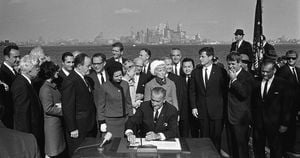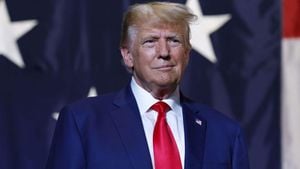With Donald Trump returning to the political forefront as the 2024 presidential race heats up, his administration’s stance on border enforcement is taking center stage once again, particularly with Texas leading the charge. The Lone Star State has positioned itself as the model for border security under Trump, gaining attention for its aggressive measures and unilateral approach.
Tom Homan, appointed as the "border czar" by Trump, recently praised Texas officials for their stringent immigration control efforts. During his visit, Homan reported to members of the Texas National Guard and state police, stating, "This is a model we can take across the country. I am impressed by what I’ve seen today." His remarks highlight the significant role Texas is expected to play as the Trump administration seeks to ramp up enforcement at the border.
Governor Greg Abbott has been particularly proactive, having spent billions over the past three years on border security initiatives. This spending has often led to tensions with the federal government, as Texas navigates legal pathways to assert its authority over immigration enforcement—an area traditionally governed by federal law. Abbott’s government has created new programs, including detention facilities and the controversial buoy barriers installed along the Rio Grande aimed at deterring migrants.
These buoy barriers recently garnered media attention, with reports detailing how they pose risks to migrants attempting to cross the river. Critics argue they exemplify the hazardous conditions migrants face, often leading to drownings. At the same time, the enforcement methods being utilized, including concertina wire and increased patrols, have drawn scrutiny and raised ethical questions.
Homan's visit to Texas coincided with the state’s announcement of plans to extend its punitive measures against undocumented migrants. Texas has initiated state-level arrests for unauthorized crossings, which many advocates for immigrant rights see as bait-and-switch tactics aimed at ensuring federal deportation policies can be smoothly implemented.
Texas has uniquely positioned itself within the Republican framework surrounding immigration enforcement. Other GOP-led states have expressed willingness to assist but lack the geographical proximity to Mexico, as seen with Texas. Utah's Governor Spencer Cox has indicated his intention to collaborate with the upcoming Trump administration. Similarly, Oklahoma's Governor Kevin Stitt has pledged to deport undocumented individuals currently incarcerated within state prisons.
Yet, Texas stands out. The state's officials have gone so far as to offer up to 1,400 acres of land near the Rio Grande for what could become mass deportation operations. Dawn Buckingham, Texas land commissioner, stated, "Whatever the federal government needs. I have hundreds of thousands of acres on the river." This eagerness to collaborate with the federal government reflects the state’s ambition to set the tone for national immigration policy.
Conversations between Abbott and Trump have confirmed the expectation of significant federal support, which Abbott believes will allow Texas to redirect its funding toward local needs, including roads and health care, once federal immigration enforcement ramps up. Texas has reportedly spent over $10 billion on border efforts since Biden took office.
Opponents of Abbott's border strategy have suggested the state should demand reimbursement from the federal government for past expenditures. This has been championed by representatives like Trey Martinez Fischer, who argue the state’s financial burden should be acknowledged and the costs should be offset by federal funding.
Advocates for immigrant rights are cautiously watching these developments, aware of the historical precedents and potential pitfalls associated with heightened state power over immigration enforcement. Since Biden’s inauguration, Abbott has sought to extend state police powers, including arresting migrants on trespassing charges on private land—a strategy critics say sets dangerous precedents surrounding state authority.
Proponents of the current Texas border policies contend they are necessary to protect national sovereignty and uphold the rule of law. They argue the influx of migrants during the Biden administration has stressed local resources and public safety.
Yet, the legal battles surrounding Texas's push to expand its power continue. Substantial challenges have emerged, especially concerning Senate Bill 4, which aimed to criminalize unauthorized crossings—a measure political opponents assert violates constitutional rights and historical legal standards.
Despite the legal hurdles, Abbott claims the state is advancing too far to turn back. His recent moves include authorizing new law enforcement units and even promoting the idea of using the military within state law enforcement's purview, which he argues could bolster national security efforts.
Those against these types of enforcement strategies voice concern over their ethical implications. Kristin Etter, director of the Texas Immigration Law Council, articulated, "Everything they’ve done under Operation Lone Star is just a prototype for how to round up immigrants, put them in harsh conditions, pretend you’re going to provide some level of due process, and then coerce people to accept deportation." These sentiments echo across various organizations committed to defending the rights of migrants.
With nearly 120,000 migrants relocated to Democratic-leaning cities through Texas's busing initiative, the state's authorities may turn this system on its head, converting buses meant for distributing migrants to use for deporting them instead. Such drastic shifts signal the potential for expanded enforcement actions as the administration shifts gears come January.
While local law enforcement officials express uncertainty about preparations on the ground for expected new directives from the Trump administration, the rhetoric indicates heavy prioritization of immigration enforcement moving forward. Sheriff Tom Schmerber of Maverick County mentioned the need for additional funding and resources to manage any new expected influx of policies and suggested genuine cooperation is ideal.
The developments surrounding Texas border policy will undoubtedly shape the national conversation on immigration under Trump. With Abbott's moves increasingly coming to resemble a prototype for national policy, how this plays out will be instrumental not only for Texas residents but for the political ramifications felt across the country. Texas’s example could very well become the touchstone for Republican-led states rallying behind strict immigration enforcement policies, reaffirming the ideological divides shaping the nation’s immigration strategy. Expect plenty of movement on this front as the election looms closer, and the imminence of Trump’s positioning continues to galvanize support from the party base.



